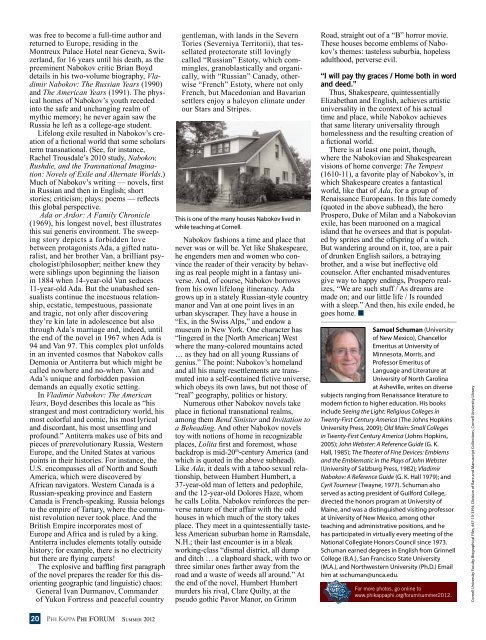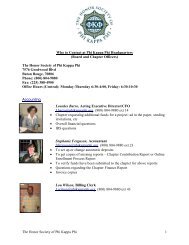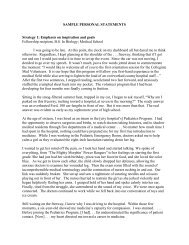Homing in on Shakespeare and Nabokov - Phi Kappa Phi
Homing in on Shakespeare and Nabokov - Phi Kappa Phi
Homing in on Shakespeare and Nabokov - Phi Kappa Phi
Create successful ePaper yourself
Turn your PDF publications into a flip-book with our unique Google optimized e-Paper software.
was free to become a full-time author <strong>and</strong><br />
returned to Europe, resid<str<strong>on</strong>g>in</str<strong>on</strong>g>g <str<strong>on</strong>g>in</str<strong>on</strong>g> the<br />
M<strong>on</strong>treux Palace Hotel near Geneva, Switzerl<strong>and</strong>,<br />
for 16 years until his death, as the<br />
preem<str<strong>on</strong>g>in</str<strong>on</strong>g>ent <strong>Nabokov</strong> critic Brian Boyd<br />
details <str<strong>on</strong>g>in</str<strong>on</strong>g> his two-volume biography, Vladimir<br />
<strong>Nabokov</strong>: The Russian Years (1990)<br />
<strong>and</strong> The American Years (1991). The physical<br />
homes of <strong>Nabokov</strong>’s youth receded<br />
<str<strong>on</strong>g>in</str<strong>on</strong>g>to the safe <strong>and</strong> unchang<str<strong>on</strong>g>in</str<strong>on</strong>g>g realm of<br />
mythic memory; he never aga<str<strong>on</strong>g>in</str<strong>on</strong>g> saw the<br />
Russia he left as a college-age student.<br />
Lifel<strong>on</strong>g exile resulted <str<strong>on</strong>g>in</str<strong>on</strong>g> <strong>Nabokov</strong>’s creati<strong>on</strong><br />
of a ficti<strong>on</strong>al world that some scholars<br />
term transnati<strong>on</strong>al. (See, for <str<strong>on</strong>g>in</str<strong>on</strong>g>stance,<br />
Rachel Trousdale’s 2010 study, <strong>Nabokov</strong>,<br />
Rushdie, <strong>and</strong> the Transnati<strong>on</strong>al Imag<str<strong>on</strong>g>in</str<strong>on</strong>g>ati<strong>on</strong>:<br />
Novels of Exile <strong>and</strong> Alternate Worlds.)<br />
Much of <strong>Nabokov</strong>’s writ<str<strong>on</strong>g>in</str<strong>on</strong>g>g — novels, first<br />
<str<strong>on</strong>g>in</str<strong>on</strong>g> Russian <strong>and</strong> then <str<strong>on</strong>g>in</str<strong>on</strong>g> English; short<br />
stories; criticism; plays; poems — reflects<br />
this global perspective.<br />
Ada or Ardor: A Family Chr<strong>on</strong>icle<br />
(1969), his l<strong>on</strong>gest novel, best illustrates<br />
this sui generis envir<strong>on</strong>ment. The sweep<str<strong>on</strong>g>in</str<strong>on</strong>g>g<br />
story depicts a forbidden love<br />
between protag<strong>on</strong>ists Ada, a gifted naturalist,<br />
<strong>and</strong> her brother Van, a brilliant psychologist/philosopher;<br />
neither knew they<br />
were sibl<str<strong>on</strong>g>in</str<strong>on</strong>g>gs up<strong>on</strong> beg<str<strong>on</strong>g>in</str<strong>on</strong>g>n<str<strong>on</strong>g>in</str<strong>on</strong>g>g the liais<strong>on</strong><br />
<str<strong>on</strong>g>in</str<strong>on</strong>g> 1884 when 14-year-old Van seduces<br />
11-year-old Ada. But the unabashed sensualists<br />
c<strong>on</strong>t<str<strong>on</strong>g>in</str<strong>on</strong>g>ue the <str<strong>on</strong>g>in</str<strong>on</strong>g>cestuous relati<strong>on</strong>ship,<br />
ecstatic, tempestuous, passi<strong>on</strong>ate<br />
<strong>and</strong> tragic, not <strong>on</strong>ly after discover<str<strong>on</strong>g>in</str<strong>on</strong>g>g<br />
they’re k<str<strong>on</strong>g>in</str<strong>on</strong>g> late <str<strong>on</strong>g>in</str<strong>on</strong>g> adolescence but also<br />
through Ada’s marriage <strong>and</strong>, <str<strong>on</strong>g>in</str<strong>on</strong>g>deed, until<br />
the end of the novel <str<strong>on</strong>g>in</str<strong>on</strong>g> 1967 when Ada is<br />
94 <strong>and</strong> Van 97. This complex plot unfolds<br />
<str<strong>on</strong>g>in</str<strong>on</strong>g> an <str<strong>on</strong>g>in</str<strong>on</strong>g>vented cosmos that <strong>Nabokov</strong> calls<br />
Dem<strong>on</strong>ia or Antiterra but which might be<br />
called nowhere <strong>and</strong> no-when. Van <strong>and</strong><br />
Ada’s unique <strong>and</strong> forbidden passi<strong>on</strong><br />
dem<strong>and</strong>s an equally exotic sett<str<strong>on</strong>g>in</str<strong>on</strong>g>g.<br />
In Vladimir <strong>Nabokov</strong>: The American<br />
Years, Boyd describes this locale as “his<br />
strangest <strong>and</strong> most c<strong>on</strong>tradictory world, his<br />
most colorful <strong>and</strong> comic, his most lyrical<br />
<strong>and</strong> discordant, his most unsettl<str<strong>on</strong>g>in</str<strong>on</strong>g>g <strong>and</strong><br />
profound.” Antiterra makes use of bits <strong>and</strong><br />
pieces of prerevoluti<strong>on</strong>ary Russia, Western<br />
Europe, <strong>and</strong> the United States at various<br />
po<str<strong>on</strong>g>in</str<strong>on</strong>g>ts <str<strong>on</strong>g>in</str<strong>on</strong>g> their histories. For <str<strong>on</strong>g>in</str<strong>on</strong>g>stance, the<br />
U.S. encompasses all of North <strong>and</strong> South<br />
America, which were discovered by<br />
African navigators. Western Canada is a<br />
Russian-speak<str<strong>on</strong>g>in</str<strong>on</strong>g>g prov<str<strong>on</strong>g>in</str<strong>on</strong>g>ce <strong>and</strong> Eastern<br />
Canada is French-speak<str<strong>on</strong>g>in</str<strong>on</strong>g>g. Russia bel<strong>on</strong>gs<br />
to the empire of Tartary, where the communist<br />
revoluti<strong>on</strong> never took place. And the<br />
British Empire <str<strong>on</strong>g>in</str<strong>on</strong>g>corporates most of<br />
Europe <strong>and</strong> Africa <strong>and</strong> is ruled by a k<str<strong>on</strong>g>in</str<strong>on</strong>g>g.<br />
Antiterra <str<strong>on</strong>g>in</str<strong>on</strong>g>cludes elements totally outside<br />
history; for example, there is no electricity<br />
but there are fly<str<strong>on</strong>g>in</str<strong>on</strong>g>g carpets!<br />
The explosive <strong>and</strong> baffl<str<strong>on</strong>g>in</str<strong>on</strong>g>g first paragraph<br />
of the novel prepares the reader for this disorient<str<strong>on</strong>g>in</str<strong>on</strong>g>g<br />
geographic (<strong>and</strong> l<str<strong>on</strong>g>in</str<strong>on</strong>g>guistic) chaos:<br />
General Ivan Durmanov, Comm<strong>and</strong>er<br />
of Yuk<strong>on</strong> Fortress <strong>and</strong> peaceful country<br />
20 Summer 2012<br />
gentleman, with l<strong>and</strong>s <str<strong>on</strong>g>in</str<strong>on</strong>g> the Severn<br />
Tories (Severniya Territorii), that tessellated<br />
protectorate still lov<str<strong>on</strong>g>in</str<strong>on</strong>g>gly<br />
called “Russian” Estoty, which comm<str<strong>on</strong>g>in</str<strong>on</strong>g>gles,<br />
granoblastically <strong>and</strong> organically,<br />
with “Russian” Canady, otherwise<br />
“French” Estoty, where not <strong>on</strong>ly<br />
French, but Maced<strong>on</strong>ian <strong>and</strong> Bavarian<br />
settlers enjoy a halcy<strong>on</strong> climate under<br />
our Stars <strong>and</strong> Stripes.<br />
This is <strong>on</strong>e of the many houses <strong>Nabokov</strong> lived <str<strong>on</strong>g>in</str<strong>on</strong>g><br />
while teach<str<strong>on</strong>g>in</str<strong>on</strong>g>g at Cornell.<br />
<strong>Nabokov</strong> fashi<strong>on</strong>s a time <strong>and</strong> place that<br />
never was or will be. Yet like <strong>Shakespeare</strong>,<br />
he engenders men <strong>and</strong> women who c<strong>on</strong>v<str<strong>on</strong>g>in</str<strong>on</strong>g>ce<br />
the reader of their veracity by behav<str<strong>on</strong>g>in</str<strong>on</strong>g>g<br />
as real people might <str<strong>on</strong>g>in</str<strong>on</strong>g> a fantasy universe.<br />
And, of course, <strong>Nabokov</strong> borrows<br />
from his own lifel<strong>on</strong>g it<str<strong>on</strong>g>in</str<strong>on</strong>g>erancy. Ada<br />
grows up <str<strong>on</strong>g>in</str<strong>on</strong>g> a stately Russian-style country<br />
manor <strong>and</strong> Van at <strong>on</strong>e po<str<strong>on</strong>g>in</str<strong>on</strong>g>t lives <str<strong>on</strong>g>in</str<strong>on</strong>g> an<br />
urban skyscraper. They have a house <str<strong>on</strong>g>in</str<strong>on</strong>g><br />
“Ex, <str<strong>on</strong>g>in</str<strong>on</strong>g> the Swiss Alps,” <strong>and</strong> endow a<br />
museum <str<strong>on</strong>g>in</str<strong>on</strong>g> New York. One character has<br />
“l<str<strong>on</strong>g>in</str<strong>on</strong>g>gered <str<strong>on</strong>g>in</str<strong>on</strong>g> the [North American] West<br />
where the many-colored mounta<str<strong>on</strong>g>in</str<strong>on</strong>g>s acted<br />
… as they had <strong>on</strong> all young Russians of<br />
genius.” The po<str<strong>on</strong>g>in</str<strong>on</strong>g>t: <strong>Nabokov</strong>’s homel<strong>and</strong><br />
<strong>and</strong> all his many resettlements are transmuted<br />
<str<strong>on</strong>g>in</str<strong>on</strong>g>to a self-c<strong>on</strong>ta<str<strong>on</strong>g>in</str<strong>on</strong>g>ed fictive universe,<br />
which obeys its own laws, but not those of<br />
“real” geography, politics or history.<br />
Numerous other <strong>Nabokov</strong> novels take<br />
place <str<strong>on</strong>g>in</str<strong>on</strong>g> ficti<strong>on</strong>al transnati<strong>on</strong>al realms,<br />
am<strong>on</strong>g them Bend S<str<strong>on</strong>g>in</str<strong>on</strong>g>ister <strong>and</strong> Invitati<strong>on</strong> to<br />
a Behead<str<strong>on</strong>g>in</str<strong>on</strong>g>g. And other <strong>Nabokov</strong> novels<br />
toy with noti<strong>on</strong>s of home <str<strong>on</strong>g>in</str<strong>on</strong>g> recognizable<br />
places, Lolita first <strong>and</strong> foremost, whose<br />
backdrop is mid-20 th -century America (<strong>and</strong><br />
which is quoted <str<strong>on</strong>g>in</str<strong>on</strong>g> the above subhead).<br />
Like Ada, it deals with a taboo sexual relati<strong>on</strong>ship,<br />
between Humbert Humbert, a<br />
37-year-old man of letters <strong>and</strong> pedophile,<br />
<strong>and</strong> the 12-year-old Dolores Haze, whom<br />
he calls Lolita. <strong>Nabokov</strong> re<str<strong>on</strong>g>in</str<strong>on</strong>g>forces the perverse<br />
nature of their affair with the odd<br />
houses <str<strong>on</strong>g>in</str<strong>on</strong>g> which much of the story takes<br />
place. They meet <str<strong>on</strong>g>in</str<strong>on</strong>g> a qu<str<strong>on</strong>g>in</str<strong>on</strong>g>tessentially tasteless<br />
American suburban home <str<strong>on</strong>g>in</str<strong>on</strong>g> Ramsdale,<br />
N.H.; their last encounter is <str<strong>on</strong>g>in</str<strong>on</strong>g> a bleak<br />
work<str<strong>on</strong>g>in</str<strong>on</strong>g>g-class “dismal district, all dump<br />
<strong>and</strong> ditch … a clapboard shack, with two or<br />
three similar <strong>on</strong>es farther away from the<br />
road <strong>and</strong> a waste of weeds all around.” At<br />
the end of the novel, Humbert Humbert<br />
murders his rival, Clare Quilty, at the<br />
pseudo gothic Pavor Manor, <strong>on</strong> Grimm<br />
Road, straight out of a “B” horror movie.<br />
These houses become emblems of <strong>Nabokov</strong>’s<br />
themes: tasteless suburbia, hopeless<br />
adulthood, perverse evil.<br />
“I will pay thy graces / Home both <str<strong>on</strong>g>in</str<strong>on</strong>g> word<br />
<strong>and</strong> deed.”<br />
Thus, <strong>Shakespeare</strong>, qu<str<strong>on</strong>g>in</str<strong>on</strong>g>tessentially<br />
Elizabethan <strong>and</strong> English, achieves artistic<br />
universality <str<strong>on</strong>g>in</str<strong>on</strong>g> the c<strong>on</strong>text of his actual<br />
time <strong>and</strong> place, while <strong>Nabokov</strong> achieves<br />
that same literary universality through<br />
homelessness <strong>and</strong> the result<str<strong>on</strong>g>in</str<strong>on</strong>g>g creati<strong>on</strong> of<br />
a ficti<strong>on</strong>al world.<br />
There is at least <strong>on</strong>e po<str<strong>on</strong>g>in</str<strong>on</strong>g>t, though,<br />
where the <strong>Nabokov</strong>ian <strong>and</strong> <strong>Shakespeare</strong>an<br />
visi<strong>on</strong>s of home c<strong>on</strong>verge: The Tempest<br />
(1610-11), a favorite play of <strong>Nabokov</strong>’s, <str<strong>on</strong>g>in</str<strong>on</strong>g><br />
which <strong>Shakespeare</strong> creates a fantastical<br />
world, like that of Ada, for a group of<br />
Renaissance Europeans. In this late comedy<br />
(quoted <str<strong>on</strong>g>in</str<strong>on</strong>g> the above subhead), the hero<br />
Prospero, Duke of Milan <strong>and</strong> a <strong>Nabokov</strong>ian<br />
exile, has been maro<strong>on</strong>ed <strong>on</strong> a magical<br />
isl<strong>and</strong> that he oversees <strong>and</strong> that is populated<br />
by sprites <strong>and</strong> the offspr<str<strong>on</strong>g>in</str<strong>on</strong>g>g of a witch.<br />
But w<strong>and</strong>er<str<strong>on</strong>g>in</str<strong>on</strong>g>g around <strong>on</strong> it, too, are a pair<br />
of drunken English sailors, a betray<str<strong>on</strong>g>in</str<strong>on</strong>g>g<br />
brother, <strong>and</strong> a wise but <str<strong>on</strong>g>in</str<strong>on</strong>g>effective old<br />
counselor. After enchanted misadventures<br />
give way to happy end<str<strong>on</strong>g>in</str<strong>on</strong>g>gs, Prospero realizes,<br />
“We are such stuff / As dreams are<br />
made <strong>on</strong>; <strong>and</strong> our little life / Is rounded<br />
with a sleep.” And then, his exile ended, he<br />
goes home. n<br />
Samuel Schuman (University<br />
of New Mexico), Chancellor<br />
Emeritus at University of<br />
M<str<strong>on</strong>g>in</str<strong>on</strong>g>nesota, Morris, <strong>and</strong><br />
Professor Emeritus of<br />
Language <strong>and</strong> Literature at<br />
University of North Carol<str<strong>on</strong>g>in</str<strong>on</strong>g>a<br />
at Asheville, writes <strong>on</strong> diverse<br />
subjects rang<str<strong>on</strong>g>in</str<strong>on</strong>g>g from Renaissance literature to<br />
modern ficti<strong>on</strong> to higher educati<strong>on</strong>. His books<br />
<str<strong>on</strong>g>in</str<strong>on</strong>g>clude See<str<strong>on</strong>g>in</str<strong>on</strong>g>g the Light: Religious Colleges <str<strong>on</strong>g>in</str<strong>on</strong>g><br />
Twenty-First Century America (The Johns Hopk<str<strong>on</strong>g>in</str<strong>on</strong>g>s<br />
University Press, 2009); Old Ma<str<strong>on</strong>g>in</str<strong>on</strong>g>: Small Colleges<br />
<str<strong>on</strong>g>in</str<strong>on</strong>g> Twenty-First Century America (Johns Hopk<str<strong>on</strong>g>in</str<strong>on</strong>g>s,<br />
2005); John Webster: A Reference Guide (G. K.<br />
Hall, 1985); The Theater of F<str<strong>on</strong>g>in</str<strong>on</strong>g>e Devices: Emblems<br />
<strong>and</strong> the Emblematic <str<strong>on</strong>g>in</str<strong>on</strong>g> the Plays of John Webster<br />
(University of Salzburg Press, 1982); Vladimir<br />
<strong>Nabokov</strong>: A Reference Guide (G. K. Hall 1979); <strong>and</strong><br />
Cyril Tourneur (Twayne, 1977). Schuman also<br />
served as act<str<strong>on</strong>g>in</str<strong>on</strong>g>g president of Guilford College,<br />
directed the h<strong>on</strong>ors program at University of<br />
Ma<str<strong>on</strong>g>in</str<strong>on</strong>g>e, <strong>and</strong> was a dist<str<strong>on</strong>g>in</str<strong>on</strong>g>guished visit<str<strong>on</strong>g>in</str<strong>on</strong>g>g professor<br />
at University of New Mexico, am<strong>on</strong>g other<br />
teach<str<strong>on</strong>g>in</str<strong>on</strong>g>g <strong>and</strong> adm<str<strong>on</strong>g>in</str<strong>on</strong>g>istrative positi<strong>on</strong>s, <strong>and</strong> he<br />
has participated <str<strong>on</strong>g>in</str<strong>on</strong>g> virtually every meet<str<strong>on</strong>g>in</str<strong>on</strong>g>g of the<br />
Nati<strong>on</strong>al Collegiate H<strong>on</strong>ors Council s<str<strong>on</strong>g>in</str<strong>on</strong>g>ce 1973.<br />
Schuman earned degrees <str<strong>on</strong>g>in</str<strong>on</strong>g> English from Gr<str<strong>on</strong>g>in</str<strong>on</strong>g>nell<br />
College (B.A.), San Francisco State University<br />
(M.A.), <strong>and</strong> Northwestern University (Ph.D.) Email<br />
him at sschuman@unca.edu.<br />
For more photos, go <strong>on</strong>l<str<strong>on</strong>g>in</str<strong>on</strong>g>e to<br />
www.phikappaphi.org/forum/summer2012.<br />
Cornell University Faculty Biographical Files, #47-10-3394, Divisi<strong>on</strong> of Rare <strong>and</strong> Manuscript Collecti<strong>on</strong>s, Cornell University Library






